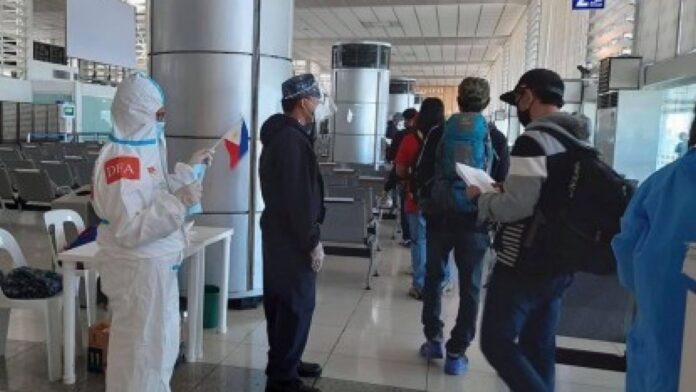The Department of Migrant Workers (DMW) assured that there will be no more cases of overseas Filipino workers (OFWs) in Saudi Arabia returning home without getting their salaries.
As the country resumes the deployment of workers to the Middle East by November 7, DMW Secretary Susan Ople said in a press conference on Friday that the Philippines and Saudi Arabia have inked deals to assure the welfare of OFWs.
“First time, iba na ang kontrata. May insurance para sa domestic workers at sa skilled workers. Hindi na mauulit na uuwing walang suweldo ang mga OFW (For the first time, the contract is different. There is insurance coverage for domestic workers and skilled workers. OFWs will never go home without their salary again),” Ople said.
“Hindi tayo basta lang magbubukas ng Saudi deployment na walang malinaw at matibay na pundasyon para sa proteksyon ng ating mga manggagawa (We will not simply resume Saudi deployment without a clear and solid foundation for the protection of our workers).”
In 2016, about 9,000 OFWs from Saudi Arabia were repatriated by the Philippine government after they stopped receiving their salaries.
Through the help of state lawyers, the OFWs won the case but have yet to get paid.
The Saudi government has not complied with the promise it made in 2021 to settle the PHP4.6 billion worth of salaries.
“The DMW expects a delegation from the Saudi MHRSD (Ministry of Human Resources and Social Development) to arrive next week for a bilateral meeting to discuss, among others, a review of OFW salaries and automation of recruitment processes. The said delegation will also discuss with the DMW the status of cases involving the unpaid salaries of thousands of Filipino construction workers dating back in 2016,” Ople said.
She said DMW labor offices in Riyadh, Jeddah, and Al-Khobar would resume accepting offers of employment for skilled Filipino workers after a year of non-hiring of new workers.
The Department of Labor and Employment suspended deployment to Saudi in 2021 due to reports of abuses and unpaid wages.
Protection assured
DMW Undersecretary Patricia Yvonne Caunan said among the labor reform measures jointly adopted by the Philippines and Saudi Arabia are:
• Employment contract with insurance coverage for domestic workers and skilled workers covering unpaid salaries, airfare, and refund of recruitment costs in case of unfinished contracts, and other contingencies. The Saudi government will shoulder the insurance cost for skilled workers while Saudi employers are mandated to pay for the insurance coverage of Filipino domestic workers.
• Pre-termination clause in the contract that would specifically allow a domestic worker to transfer to or change employers before the end of the contract based on certain grounds, such as the non-payment of salary and cases of abuse/maltreatment.
• Adoption of a joint alternative dispute settlement mechanism that would pave the way for a more transparent, fair, and amicable settlement of employment disputes.
• Integration of the contract and implementation of the Wage Protection Program, which will regulate and ensure the timely payment of wages to all OFWs.
• Direct referral of cases involving the trafficking and exploitation of OFWs to the MHRSD through its anti-human trafficking department.
Other ‘firsts’
There will also be welfare desk offices (WEDO) in all Saudi recruitment agencies.
“Lahat ng Saudi recruitment agencies ay kailangang mag-hire ng sarili nilang WEDO. Kung wala silang welfare officer, wala silang job order (All Saudi recruitment agencies are required to hire their own WEDO. If they don’t have a welfare officer, they don’t have a job order),” Ople said.
The DMW and the Saudi government will likewise have blacklist and whitelist categories for recruitment agencies and employers.
The blacklist will include abusive employers and agencies while those who are following the rules and treating the workers properly will be on the whitelist.
Victims of human trafficking will be assisted by the Saudi government based on referrals from the DMW.
Payments will be made via digital or electronic methods, which means concrete evidence if the salary is delayed or incorrect. (PNA)


